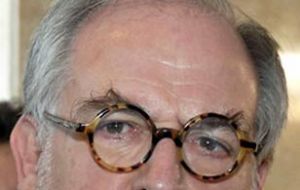MercoPress. South Atlantic News Agency
Bolivia and Brazil discuss energy and exploitation of strategic minerals
 Marco Aurelio Garcia, President Lula da Silva’s main foreign affairs advisor
Marco Aurelio Garcia, President Lula da Silva’s main foreign affairs advisor Bolivia and Brazil are considering a vast joint investment program to industrialize natural gas and for the exploitation of strategic minerals in the salt plains of the land-locked Andean country.
A Brazilian delegation headed by President Lula da Silva’s main foreign policy advisor and strategist Marco Aurelio García is currently in La Paz for a round of meetings with Bolivian ministers and president Evo Morales.
The issues to be discussed include “energy, hydroelectric integration, construction of a chemical industry pole based on natural gas in the joint border, industrialization of Bolivian lithium and combating narcotics trade”, said Bolivian diplomatic sources.
Bolivia and Brazil already have a two-decade treaty dating back to 1999, by which the Andean country supplies 30 million cubic metres of natural gas daily, to the industrial hub of Sao Paulo, South America’s largest.
Brazil has also extended “soft” loans to Bolivia to help with roads infrastructure and for a bi-oceanic corridor in the north of the country, linking La Paz with Riberalta next to the Brazilian state of Rondonia.
But energy and mining remain as top of the list issues.
Bolivia has requested Brazilian technology and resources to build a chemical industry pole for the industrialization of natural gas in Pueblo Suarez, to the east of the country and neighbouring with the state of Matto Grosso do Sul.
“We are trying to help Bolivia, associate with Bolivia to industrialize natural gas”, said the Brazilian ambassador in La Paz Frederik Cesar de Araújo.
Bolivia has the largest proven reserves of natural gas in South America behind Venezuela.
The second issue according to ambassador de Araujo is the participation of Brazilian private mining companies in the exploitation and industrialization of mineral resources in the salt plains of Uyuni, the largest salt desert in the world, which holds some of the greatest world reserves of lithium and potassium.
“Vale do Rio Doce is interested in exploiting with Bolivia possible associations in the Uyuni salt desert, particularly potassium”, said de Araujo.
Vale do Rio Doce from Brazil is one of three world leading corporations in mining and minerals industrialization.
Another issue is to establish cooperation policies in combating the narcotics trade which is a shared problem along the 3.100 kilometres common Bolivian-Brazilian border.
Some of the drug is produced in Bolivia, which together with that coming from Peru ends up in the Brazilian markets, plus the fact that the Bolivian police recently discovered a network of drug labs close to the border.
The bilateral talks can be interpreted as an attempt by both sides to “diversify relations”, since until now they have been concentrated on the natural gas supplied by Bolivia to Brazil.
“The visit of professor Marco Aurelio Garcia is a significant step in that direction”, said Dilma Rousseff, the Workers Party presidential candidate.




Top Comments
Disclaimer & comment rulesCommenting for this story is now closed.
If you have a Facebook account, become a fan and comment on our Facebook Page!